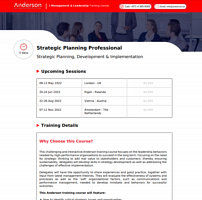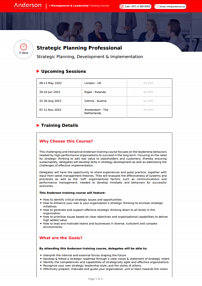- Course Finder
- Formats
- Training Topics
- Business Strategy
- Management & Leadership
- Personal Development Skills
- Innovation & Creativity
- Emotional Intelligence
- Governance and Compliance
- Business & Life Synergy
- Business Agility
- Business Sustainability
- Executive & Administrative Support
- Customer Service
- Sales & Marketing
- Human Resource HR Management
- Finance & Budgeting
- Data Science and Protection
- Project Management
- CertNexus
- Special Courses
- 10 Day Seminars
- The Essential Skills
- The Advanced Skills
- The Mini MBA Series
- Bootcamps
- Training Venues
-
- Certificates
- Calendars
- About us
- الدورات العربية
Upcoming Sessions
| 29 Jul-02 Aug 2024 | Dubai - UAE | $5,950 |
| 28 Oct-01 Nov 2024 | London - UK | $5,950 |
| 13-17 Jan 2025 | London - UK | $5,950 |
Training Course Overview
Financial information provides an essential basis for all business managers to undertake their roles effectively and confidently. Financial information originates from the organization’s accounting system, and represents a comprehensive view of events that have already occurred, but it also provides an ideal database for forecasting future events, for preparing budgets, for setting targets, and maintaining control of operations. It can also be used to measure comparative performance and profitability.
This Anderson training course is designed to provide managers with the skills to understand, interpret, and utilize financial information, and to apply this in planning, controlling, and making decisions which are informed, logical, and which add value to their organization.
Training Course Objectives
By attending this Anderson training course, delegates will be able to:
- Understand how financial statements are prepared, and what they mean
- Analyse and interpret annual financial statements
- Know how cost analysis helps us with control, resource allocation, and pricing
- Appreciate the importance of budgets, and how they are prepared
- Be aware of how our company is financed, and what is the annual cost
- Use a variety of techniques to evaluate new investment proposals
- Recognize and manage financial risks, using a range of techniques
Designed For
This Anderson training course is designed for those non-financial staff who wish to gain a better understanding of how finance supports all of the operations and activities of their business. For example this would include managers and supervisors in:
- Sales and marketing
- Logistics and supply
- Human resource
- Production and engineering
- Risk management and internal audit
Day One: The Nature and Purpose of Accounting and Finance
- Why is accounting and finance necessary?
- The role and structure of the Finance Function
- Basic principles of financial accounting
- Teamwork Exercise: Recording business transactions
- Teamwork Exercise: Applying financial judgement in accounting reporting
- Teamwork Exercise: Preparing simple financial statements
Day Two: Understanding the Financial Statements
- The format and structure of the Income Statement and the Balance Sheet
- Why cash flow is important
- Teamwork Exercise: Preparing a Cash Flow Statement
- Published financial reports – format and content
- Techniques for interpreting financial reports
- Teamwork exercise and presentation: Using ratios to assess a company’s performance
Day Three: Using Financial Information for Control and Decision-Making
- Analysing and using financial information
- Teamwork Exercise: Preparing a product cost summary
- Cost-Volume-Profit and Break-Even Analysis
- Teamwork Exercise: Using CVP analysis for decision-making
- Preparing budgets – How and Why?
- Teamwork Exercise: Preparing budgets for a manufacturing business
Day Four: Finance and Investment
- Sources and types of long term finance
- Short-term finance and working capital
- Teamwork Exercise: Preparing a business plan
- Estimating our cost of capital
- Why investment is essential for profitability and growth
- Teamwork Exercise: Appraising new investment proposals
Day Five: Controlling Financial Risks
- The financial risks faced by our business
- Managing financial risks using the ‘four Ts
- Techniques for dealing with investment risk
- Teamwork Exercise: Assessing and managing investment risk
- Techniques for dealing with foreign currency risk
- Teamwork Exercise: Hedging the risks of foreign currency transactions
- Anderson Certificate of Completion will be provided to delegates who attend and complete the course
Training Course Overview
Financial information provides an essential basis for all business managers to undertake their roles effectively and confidently. Financial information originates from the organization’s accounting system, and represents a comprehensive view of events that have already occurred, but it also provides an ideal database for forecasting future events, for preparing budgets, for setting targets, and maintaining control of operations. It can also be used to measure comparative performance and profitability.
This Anderson training course is designed to provide managers with the skills to understand, interpret, and utilize financial information, and to apply this in planning, controlling, and making decisions which are informed, logical, and which add value to their organization.
Training Course Objectives
By attending this Anderson training course, delegates will be able to:
- Understand how financial statements are prepared, and what they mean
- Analyse and interpret annual financial statements
- Know how cost analysis helps us with control, resource allocation, and pricing
- Appreciate the importance of budgets, and how they are prepared
- Be aware of how our company is financed, and what is the annual cost
- Use a variety of techniques to evaluate new investment proposals
- Recognize and manage financial risks, using a range of techniques
Designed For
This Anderson training course is designed for those non-financial staff who wish to gain a better understanding of how finance supports all of the operations and activities of their business. For example this would include managers and supervisors in:
- Sales and marketing
- Logistics and supply
- Human resource
- Production and engineering
- Risk management and internal audit
Day One: The Nature and Purpose of Accounting and Finance
- Why is accounting and finance necessary?
- The role and structure of the Finance Function
- Basic principles of financial accounting
- Teamwork Exercise: Recording business transactions
- Teamwork Exercise: Applying financial judgement in accounting reporting
- Teamwork Exercise: Preparing simple financial statements
Day Two: Understanding the Financial Statements
- The format and structure of the Income Statement and the Balance Sheet
- Why cash flow is important
- Teamwork Exercise: Preparing a Cash Flow Statement
- Published financial reports – format and content
- Techniques for interpreting financial reports
- Teamwork exercise and presentation: Using ratios to assess a company’s performance
Day Three: Using Financial Information for Control and Decision-Making
- Analysing and using financial information
- Teamwork Exercise: Preparing a product cost summary
- Cost-Volume-Profit and Break-Even Analysis
- Teamwork Exercise: Using CVP analysis for decision-making
- Preparing budgets – How and Why?
- Teamwork Exercise: Preparing budgets for a manufacturing business
Day Four: Finance and Investment
- Sources and types of long term finance
- Short-term finance and working capital
- Teamwork Exercise: Preparing a business plan
- Estimating our cost of capital
- Why investment is essential for profitability and growth
- Teamwork Exercise: Appraising new investment proposals
Day Five: Controlling Financial Risks
- The financial risks faced by our business
- Managing financial risks using the ‘four Ts
- Techniques for dealing with investment risk
- Teamwork Exercise: Assessing and managing investment risk
- Techniques for dealing with foreign currency risk
- Teamwork Exercise: Hedging the risks of foreign currency transactions
The Certificate
-
Anderson Certificate of Completion will be provided to delegates who attend and complete the course
Info & In-house Solution
For more information about this course, call or email us at:
Call us: +971 4 365 8363




